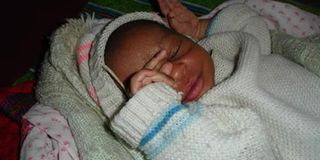Acute lack of equipment to treat newborns with jaundice

At least two babies born at Mulago hospital every day will require phototherapy as a result of jaundice.
Several babies born in Mulago hospital daily require special care as a result of a condition which causes skin discolouration at birth. Lilian Namagembe visited the newborn special care unit and explains the acute need for more phototherapy machines to treat babies born with jaundice.
At least two babies born at Mulago hospital every day will need a phototherapy machine as a result of jaundice, a common condition in newborns where the skin turns yellow because of too much bilirubin in the blood, according to doctors.
According to the doctors at the hospital’s special care unit on fifth floor at Mulago hospital, the premature unlike the normal babies, have to be treated under the machine for at least a week, so as to reverse the condition or risk death.
“Although the normal babies are usually put under the sun at home to regain their skin colour, premature babies cannot undergo the same,” says Dr Sarah Mulindwa, the in charge of the special care unit for babies at Mulago hospital.
But despite the high demand at the hospital, Dr Mulindwa said the hospital has got only seven photo therapy machines to support the newborns yet each of the infants has to stay under the machine for a period of at least one week.
Experience with the skin discolouration
In the special care unit, Nahia Muhumuza, 23 was admitted a month ago after having a premature birth at seven and a half months.
Muhumuza says her baby who weighed 1.5kgs at the time of birth, turned yellow one week after birth.
“My baby’s body first turned cream one week after birth and I thought it was because I had put her in cream clothes but two days later, I realised that her body had turned yellow, “she narrates as she looks at the baby who is also supported by the oxygen supply machine.
Muhumuza adds that it was fortunate she had stayed on the hospital ward for the doctors to continue monitoring her baby’s health until she got better.
“Fortunately, doctors came to my rescue immediately, and took the baby to the phototherapy machine where she spent one week. I would only go there to feed her and ensure that her eyes were not exposed to the machine light,”Muhumuza says noting that the machine, however, causes the baby to become very weak.
How phototherapy works
Dr Mulindwa explains that the affected baby lies in an enclosed crib (incubator) and is exposed to a type of fluorescent light that is absorbed by the baby’s skin during which bilirubin in the baby’s body is changed into another form that can be more easily excreted in the stool and urine.
She says, “A baby with jaundice may need to stay under a phototherapy light for several days depending on their age. Phototherapy doesn’t damage a baby’s skin.”
Dr Mulindwa says that while under the machine, the baby is undressed so that as much skin as possible is exposed to the light though the baby’s eyes must be covered to protect the nerve layer at the back of the eye from the bright light.
Relief through charity
Last week, singer Angella Katatumba through her organisation, the Angella Katatumba Development Foundation (AKDF) under the Mulago Yaffe campaign, donated a phototherapy machine and a syringe pump, worth Shs10m.
While receiving the equipment at the hospital, Dr Doreen Birabwa Male, the hospital executive director said the hospital would require around 20 machines to be able to reduce on time that the babies wait before they are put under the machine due to congestion.
‘We have to put three babies at a time and have to keep interchanging them so that no baby dies due to delays,” she said, adding, “We appreciate Angella Katatumba’s contribution but we still have a shortage and need more support.”
While handing over the machines, Katatumba urged the public to bear with the hospital rather than simply criticising.
About jaundice
Jaundice, a common condition in newborns, refers to the yellow colour of the skin and whites of the eyes that happens when there is too much bilirubin in the blood.
Bilirubin is produced by the normal breakdown of red blood cells. Normally, it passes through the liver, which releases it into the intestines as bile (a liquid that helps with digestion).
Jaundice happens when bilirubin builds up faster than a newborn’s liver can break it down and pass it from the body. Here are some reasons why:
Newborns make more bilirubin than adults do since they have more turnover of red blood cells.
A newborn baby’s still-developing liver might not be able to remove enough bilirubin from the blood.
A baby’s intestines absorb bilirubin that would normally leave the body in the stool (poop).
Severe jaundice (when levels of bilirubin are high, usually above 25 mg) that is not treated can cause deafness, cerebral palsy, or other forms of brain damage. In rare cases, jaundice may be a sign of of another condition, such as an infection or a thyroid problem.
Doctors recommend that all infants be checked for jaundice within a few days of birth.
Jaundice of prematurity: This is common in premature babies since their bodies are even less ready to excrete bilirubin effectively. To avoid complications, they’ll be treated even when their bilirubin levels are lower than those of full-term babies with normal jaundice.
Jaundice can also happen when breastfeeding babies don’t get enough breast milk due to difficulty with breastfeeding.




